Only articles in with the "PEP-NET" tag are displayed
To display all articles click
here.
 |
28. July 2011 – 16:49 by Asociacion Ciudades Kyosei / Pedro Prieto-Martin
|
“The e-(R)evolution will not be funded. An interdisciplinary and critical analysis of the developments and troubles of EU-funded eParticipation” is the title of a paper that our association recently wrote as part of our research and knowledge dissemination efforts. The article is meant to be properly published soon, but some bureaucratic issues have delayed its release more than we can wait.
Because this paper needs to be read and, more important, discussed while its analyses are still current.
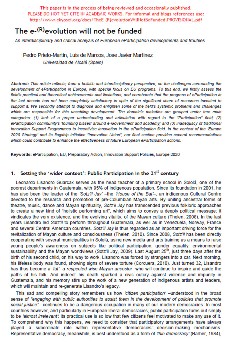 Thus, we have decided to make it provisionally available through PeP-NET. To start such a conversation, what better place than PeP-NET, the Pan European eParticipation network?
Thus, we have decided to make it provisionally available through PeP-NET. To start such a conversation, what better place than PeP-NET, the Pan European eParticipation network? 
We have spent many hundreds of hours researching and writing the paper, as we struggled to make sense of the developments and “under-developments” of eParticipation in the last ten years.
Our appraisal is based on an extensive and interdisciplinary analysis of distinct relevant sources, which included the most recent reports, articles and literature reviews dealing with eParticipation research, practice and theory, as well as projects’ deliverables and evaluations, related databases, and our direct examination of eParticipation systems.
We had to resort to a very varied bunch of disciplines (from history and medicine to Mayan performing arts; seriously!!  ) to be able to achieve a comprehensive understanding of the field’s challenges… and to make a compelling exposition of them.
) to be able to achieve a comprehensive understanding of the field’s challenges… and to make a compelling exposition of them.
The paper ended up being “quite controversial”, as our assessment of eParticipation came to suggest that some of the problems that have hampered its progress have a systemic, overarching character: that kind of ‘elephant in the living room’-issues whose very existence tends to be denied because of their complexity or the embarrassment they cause and, as a result, cannot normally be acknowledged or discussed, let alone get properly sorted out.
Examples of the “embarrassing questions” the paper poses are:
- How can it be that after 10 years… all relevant ‘agendas’ of eParticipation research are still reported as underdeveloped?
- And how can it be that even the most basic questions –for example: the relation of Participation and eParticipation, or the understanding of the dual nature of eParticipaton as something that can be driven by authorities or by citizens themselves– remain unsolved?
- More than 187 millions of Euros were invested in the last ten years to promote experimentation in the field, so… where are the results? Where are the breakthroughs and the research milestones? Can we feel satisfied with just some “vague confirmations” of ideas that 10 years ago could already have been easily guessed?
Through the paper, we have done our best to constructively diagnose eParticipation and to propose some treatments for the field’s maladies. But our perspective and understanding are necessarily limited: the real “treatment” for those problems would require a reflection process that involves the whole eParticipation community.
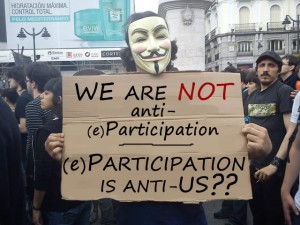 We see this paper as an urgent “call for self-reflection” and consider it a “MUST READ” for anyone involved in European eParticipation: from the officials working at EC’s Directorate for Information society and Media, to the researchers, practitioners, NGOs, public workers, citizen associations… and even any interested European citizen.
We see this paper as an urgent “call for self-reflection” and consider it a “MUST READ” for anyone involved in European eParticipation: from the officials working at EC’s Directorate for Information society and Media, to the researchers, practitioners, NGOs, public workers, citizen associations… and even any interested European citizen.
Therefore, we would like to encourage all our PeP-NET friends and in general all people with interest in eParticipation… to have a look at the paper during this nice summer weekend. 
Anyone who feels “touched” by any of the paper’s claims and argumentations… should speak up and comment to this post. It doesn’t matter if it is to support, extend or complement our asseverations, or to oppose, challenge or further qualify them… please, share your views.
PeP-NET was meant to be a HUB for the conversations around eParticipation. So… let’s discuss. It is important that the issues we showed –be them real or imagined– are talked about, and possibly acted upon.
The environment where we operate is moving. Moving faster and faster. And in the context of the ‘Europe 2020 Strategy’ and its flagship initiative “Innovation Union”, which aims to renew EU’s “Research and Innovation Funding Programmes”, the most important question we need to answer is: “What do we do now??”
For sure, we could keep pretending that there is NO elephant in the living room. Stay in our “academic” Ivory Tower, and just continue doing as we did so far… while we wait for the “barbarians of eParticipation” to arrive, change the democratic landscape by really integrating ICT in governance… and make fools of all us. PeP-NET subscribers included. 
But in our association we want to believe that we, the European eParticipation Community, could do much better than that.
So… no more to say!! Thank you very much for your attention. We hope some of you enjoy reading of our paper and some exchange of ideas can happen afterwards.
—– ADDITION: A CONCEPTUAL MAP SUMMARISING PAPER’S KEY FINDINGS —–
Several people asked for a “summary” version of the paper. Here you have a JPG image (2,5 Mbytes) displaying a Conceptual Map that summarises the paper’s key findings.
I recommend you to save the file first, and then open it with an image editor (like Office Picture Manager) to watch it. It’ll be more easy for you to zoom in and out in the different parts of the image.
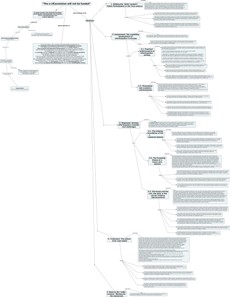
Posted in ICT, Projects, Tools, Trends, Visions | 20 Comments »
 |
27. April 2010 – 14:57 by Luca Raffini (University of Bergamo)
|
Sono disponibili online gli atti del seminario “E-democracy 2.0 – Istituzioni, cittadini, nuove reti: un lessico possibile” (pdf):
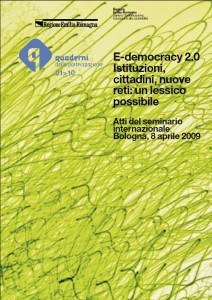 Il volume riporta integralmente i lavori del seminario internazionale tenutosi l’8 aprile 2009 a Bologna e organizzato dalla Regione Emilia-Romagna, in collaborazione con l’Università di Bergamo, l’associazione DEPP e il network europeo Pep-net.
Il volume riporta integralmente i lavori del seminario internazionale tenutosi l’8 aprile 2009 a Bologna e organizzato dalla Regione Emilia-Romagna, in collaborazione con l’Università di Bergamo, l’associazione DEPP e il network europeo Pep-net.
Nel corso del seminario, esperti italiani e internazionali, amministratori e practicioners, hanno tracciato un quadro delle esperienze di e-democracy realizzate in Italia e in Europa, evidenziandone limiti e potenzialità e individuando possibili prospettive di sviluppo. La strutturazione del seminario e il coinvolgimento di una pluralità di punti di vista e di competenze, ha consentito di affrontare, in una cornice integrata, le potenzialità democratiche del web 2.0, sia con riferimento alle esperienze di e-democracy istituzionale che alle forme di partecipazione online “dal basso”.
Le presentazioni dei relatori, Sabrina Franceschini, Anna Carola Freschi, Bryan Loader, Sandra Lotti, Wainer Lusoli, Rolf Lührs, Peter Mambrey, Mayo Fuster Morell, Luca Raffini, Laura Sartori, Chiara Sebastiani e il vivace dibattito che ha visto interagire i relatori con i numerosi partecipanti (oltre 160), hanno permesso di confrontare una pluralità di approcci teorici e pratiche. Loader in particolare ha sottolineato sia il carattere ambivalente dell’utilizzo delle nuove tecnologie come strumento di partecipazione e di ‘strong democracy’ oppure come semplice perfezionamento della democrazia neoliberista, sia la relazione fra utilizzo delle nuove tecnologie e processi di de-istitutionalizzazione.
Sebastiani ha evidenziato come le nuove tecnologie contribuiscono a trasformare la sfera pubblica e le pratiche democratiche, mentre Sartori si è soffermata sulla persistenza della questione del digital divide non solo in termini di accesso ma anche in termini di cultura digitale. Si è guardato all’esperienza statunitense, con particolare riferimento alla campagna elettorale di Barak Obama, per riflettere sulle opportunità di empowerment offerte dai nuovi strumenti del web 2.0 (Lusoli). Read the rest of this entry »
Posted in Uncategorized | 3 Comments »
 |
20. April 2010 – 10:37 by Centre for E-Government
|
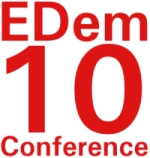 “A revolution doesn’t happen when a society adopts new tools. It happens when society adopts new behaviours.“ (Clay Shirky)
“A revolution doesn’t happen when a society adopts new tools. It happens when society adopts new behaviours.“ (Clay Shirky)
EDem10
4th International Conference on eDemocracy
6. and 7. May 2010
Danube-University Krems
Conference Programme
There will be a PEP-NET Workshop!
Keynotes
- Distribution and Empowerment: Embedding Citizens at the Heart of Democracy
Andy Williamson
- Goverati: E-Aristocrats or the Delusion of E-Democracy
Ismael Peña-López
- The Promise and Contradictions of E-Democracy, Obama Style
Micah L. Sifry
- Open Access to Research: Changing Researcher Behavior through University and Funder Mandates
Stevan Harnad
Find the full programme here.
Registration
Please register at the Conference Website. Please indicate ‘special status’ as “PEP-NET Member” to profit from full discount when registering at the website.
PEP-NET Meeting
Please do not forget to register for the PEP-NET Meeting in Krems, Austria.
You find further information here in this Blog.
Posted in Events | No Comments »
 |
6. October 2009 – 09:27 by Rolf Luehrs
|

The PEP-NET blog has developed very well in the recent months. However, we believe that there is still room for improvement. One thing we have now addressed is multilingualism.
There are several reasons for this enhancement: First of all we are convinced that (e-) participation is in most cases dealing with local or regional issues. There are amazing projects we will never hear about on this blog because the involved or responsible parties do not feel comfortable to write about them in English.
Secondly public administrations are as well focused on their local, regional or national themes. The motivation for many of them to join our international network is currently not strong enough. This hopefully changes if they could communicate about their experiences and demands in their own language and also exchange opinions among each other.
Finally, we are an European network and what is more typical for Europe than all the different languages we are talking in – for the good and the bad.
We are nevertheless hoping (and confident:) that most of the contributions will still be posted or translated in English. Our partner ASAEL has shown that this is possible. But it is no longer mandatory. To prevent us ending up in the Confusion of Tongues, we have provided little flags in the top right corner where our readers may choose to read postings in all or only in particular languages.
We started with Spanish/ English since up to now postings have only been written in these two languages. But we will add other flags as soon as our members are starting to use them.
Feedback is highly appreciated
Posted in Uncategorized | 2 Comments »
 |
22. July 2008 – 16:37 by Rolf Luehrs
|
PEP-NET welcomes five new associate members (in alphabetical order):
Asociación Ciudades Kyosei
The spanish-based association, the “Asociación Ciudades Kyosei” aims to provide a free non-partisan environment to foster municipal civic participation. NGOs, citizens, civil servants, politicians & media will be provided with tools to communicate, discuss, carry out participatory processes, coordinate internal work, etc. This environment, whose name is Kyosei-Polis, will provide e-Participation tools to any organization -first of all: public authorities- willing to involve citizens to work for the “common good”.
Center for E-Government – Danube University Krems
The Centre for E-Government at the Danube Unvierstiy Krems,Austria is a leading Austrian competence centre for education in E-Government and related disciplines, including law, organisational theory and information technology.We focus on post-graduate education and
reaserch in the areas within and related to E-Government.
The centre for E-Government has been conducting research in the area of eParticipation for a number of years, including the following projects:
- Youth Participation Project mitmachen.at
- Youth Participatin Project jugend2help.gv.at (ongoing)
- Enhancing Western Balkan e-Government Expertise (ongoing)
- Responsible for the Working Group E-Democracy and E-Particiaption at
- the Austrian Chancellery
Gov2U
Gov2U was conceived and founded in 2005 as a non-profit, non-
governmental organization by a group of visionary professionals from
the fields of Legislative Information and Communication Technology
(ICT) and community activism aiming to develop tools that facilitate
the everyday work of elected officials and that offer citizens a
greater stake in political discourse by enabling them to contribute
their ideas, suggestions, and opinions.
International Teledemocracy Centre, Napier University (ITC)
Working closely with governments, parliaments and NGOs across Europe and worldwide, ITC has established an international reputation as a research centre that combines relevant software engineering applications with political and sociological analysis.
ITCs remit is to research and apply information and communication technologies to enhance and support the democratic decision-making processes.
Public-i
Public-i is a privately owned company focused on democratic engagement and advise Local Authorities on the effective use of multimedia and webcasting. Public-i helps Local Authorities in 8 European countries to create and deliver audiovisual content that really makes an impact in the local
community.
In case your organisation considers a PEP-NET membership as well, please do not hesitate to contact us. Just drop us a note (luehrs@pep-net.eu or feil@pep-net.eu ) and we will contact you soon.
Posted in members, News | 1 Comment »
 |
29. May 2008 – 07:48 by christophdowe-politik-digital.de
|
Part of the Pep-Net project is to make good examples of projects more visible. e-participation.net is part of the new european network Pep-Net and collects data about participatory online projects. Is your best practice example included already? Do you know of more examples? To report new examples just fill in the box at the right column – we only need the URL! The data will be delivered to an editor at politik-digital.de where a short description of the website will be written. If you want, you can also send us more information.
The website, built by politik-digital.de and the British Council Germany about one year ago, already consists of a database of about 200 projects. Now its time to include some more examples from other countries! Before launch, the partners had published a short study (PDF) in 2006, comparing the state of the art of e-Democracy in Germany and the United Kingdom (“Facilitating active Citizenship. E-Participation in the United Kingdom and Germany”).
Posted in News, Partners | 4 Comments »
 |
1. May 2008 – 06:00 by Bengt Feil (TuTech Innovation GmbH)
|
May 1st has been set as the official launch date of the Pan European eParticipation Network. With that date having arrived we looking forward to working with our initial partners and everybody joining us on our way.
In the next years we will try to advance the participatory efforts in Europe and to build a open and strong network including members from all stakeholders active in the field.
As PEP-NET is all about exchange of knowledge and the will to further develop eParticipation in Europe we ask everyone to join our conversation both online and offline.
INSERT_MAP
Posted in News | 6 Comments »
 Thus, we have decided to make it provisionally available through PeP-NET. To start such a conversation, what better place than PeP-NET, the Pan European eParticipation network?
Thus, we have decided to make it provisionally available through PeP-NET. To start such a conversation, what better place than PeP-NET, the Pan European eParticipation network? ![]()
![]() ) to be able to achieve a comprehensive understanding of the field’s challenges… and to make a compelling exposition of them.
) to be able to achieve a comprehensive understanding of the field’s challenges… and to make a compelling exposition of them. We see this paper as an urgent “call for self-reflection” and consider it a “MUST READ” for anyone involved in European eParticipation: from the officials working at EC’s Directorate for Information society and Media, to the researchers, practitioners, NGOs, public workers, citizen associations… and even any interested European citizen.
We see this paper as an urgent “call for self-reflection” and consider it a “MUST READ” for anyone involved in European eParticipation: from the officials working at EC’s Directorate for Information society and Media, to the researchers, practitioners, NGOs, public workers, citizen associations… and even any interested European citizen.![]()
![]()


 Il volume riporta integralmente i lavori del seminario internazionale tenutosi l’8 aprile 2009 a Bologna e organizzato dalla Regione Emilia-Romagna, in collaborazione con l’Università di Bergamo, l’associazione DEPP e il network europeo Pep-net.
Il volume riporta integralmente i lavori del seminario internazionale tenutosi l’8 aprile 2009 a Bologna e organizzato dalla Regione Emilia-Romagna, in collaborazione con l’Università di Bergamo, l’associazione DEPP e il network europeo Pep-net.







